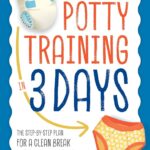Some links on our blog are affiliate links, meaning at no extra cost to you, we may earn a commission if you purchase through them. We participate in the Amazon Affiliate Program, and we recommend products we believe in. Your support helps us keep providing valuable content. Thank you!
Three-Day Potty Training is an intensive method designed for quick results, emphasizing a focused and consistent approach over a short period.
Typically aimed at toddlers, this method promises to transition children from diapers to using the potty within just three days.
It requires significant preparation and commitment from parents, but when executed with dedication, it can be highly effective for many families.
Here’s what you need to know about the Three-Day Potty Training method:
Key Principles:
Full Commitment: Parents must be able to dedicate three full days to focus exclusively on potty training.
This means clearing the schedule of any other commitments to focus entirely on the child’s potty training needs.
No Diapers: During these three days, children are encouraged not to wear diapers (except during naps and bedtime).
This is meant to help them recognize the sensation of needing to use the bathroom and to act on it immediately.
Frequent Reminders and Prompting: Parents remind the child to use the potty at regular intervals and encourage them to tell an adult when they need to go.
The goal is to develop the child’s awareness and responsibility for their bathroom needs.
Positive Reinforcement: Successes are celebrated with praise, clapping, and sometimes small rewards.
This positive reinforcement encourages the child to continue using the potty.
Preparation: Before starting the three-day method, parents often prepare by reading about the technique, gathering necessary supplies (like a potty chair), and explaining the process to their child to set expectations.
Advantages:
Quick Results: For many families, this method can lead to rapid success, with children learning to use the potty within a few days.
Clear Focus: The intensive nature of the method allows both parents and children to focus solely on potty training, without distractions.
Building Confidence: Quick successes can build a child’s confidence in their ability to use the potty, fostering a sense of achievement.
Considerations:
High Parental Involvement: This method requires constant vigilance and effort from parents, which can be demanding.
Pressure: The intensive nature might create pressure for both the child and the parents, potentially leading to stress if expectations are not met.
Not for Every Child: Some children may not respond well to the rapid pace and may require a more gradual approach to potty training.
Accidents and Setbacks: Despite the name, it’s normal for accidents to occur even after the initial three-day period. Continued patience and encouragement are crucial.
In Conclusion
Three-Day Potty Training is best suited for parents and children ready for a fast-paced approach and willing to commit fully to the process over a short period.
Success with this method depends on consistency, positive reinforcement, and readiness of the child.
While it offers the promise of quick results, it’s important to approach it with realistic expectations and a willingness to adapt based on your child’s needs and reactions.
Potty Training in 3 Days: The Step-by-Step Plan for a Clean Break from Dirty Diapers is a recommended book that you can find on Amazon.








